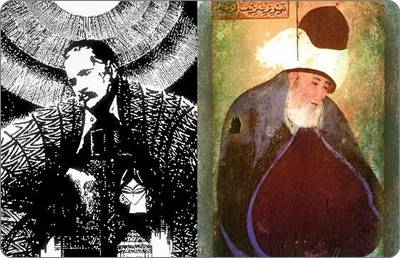“I perfomed Azaan in the Haram, like Maulana Rumi”
“I performed Azaan in the Haram [Kaaba] , like Maulana Rumi
I learned from him and unleashed the secrets of life
He [Maulana Rumi] faced the turbulent times of his times
And I face the turbulent times of this present”
چو رومی در حرم دادم اذان من
ازو آمو ختم اسرار جان من
بہ دور فتنہ عصر کہن او
بہ دور فتنہ عصر رواں من

Portrait of Allama iqbal and Maulana Rumi
Maulana Rumi [1207 – 1273] lived a life of turbulence as his family had to migrate from Balkh [current Afghanistan] due to Mongol invasions. Rumi’s father Bahā ud-Dīn Walad was a famed Scholar of Islam and known as Sultan-ul-Ulema at that time for his knowledge of Islam. They travelled through many cities such as Malatya, Erzincan, Sivas, Kayseri and Nigde and eventually settled in Karaman [South of Turkey].
It is narrated that Rumi as a child also met Shaykh Fariduddin Attar who presented Rumi with his Asrārnāma. Shaykh Attar was visionary Sufi saint and when he saw Rumi coming behind his father, he exclaimed, “Here comes the sea [of knowledge] followed by a larger ocean!”
With his Masnavi, a poetry compilations that spans over 25000 verses, Maulana Rumi influenced Sufism like no other and his ocean of wisdom indeed gave birth to many seas, Dr. Allama Iqbal being one of them.
Allama Iqbal lived through turbulents time as it was the time South Asia was fighting for its independence from British Raj Rule. Allama spent years in England and Germany for his studies and upon his return took part in this freedom movement. His visit to Spain was emotional as he witnessed the glory of Islam and he continuously thought about the revival of Muslim Ummah which he penned in both his poetry compilations as well as prose.
There verses by Allama reflect this struggle as his compares his toil to Mevlana’s Rumi’s efforts and says both of us reveal the secret of the Self. Allama and Rumi’s relationship was of a protege and a mentor and his love and respect for Maulana is same way as Maulana’s love and reverence for his mentor, Shamz Tabraiz.



